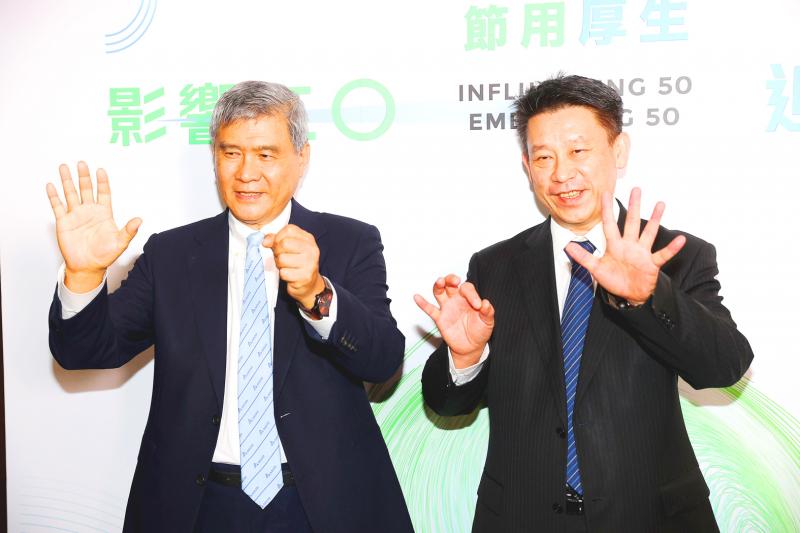Delta Electronics Inc (台達電) aims to maintain a 10 percent share of the global power and traction components market for electric vehicles (EVs) going forward, the company said at its 50th anniversary celebration in Taipei yesterday.
“The total addressable market for power and traction components in EVs is expected to reach US$33 billion by 2030,” Delta chief executive officer Cheng Ping (鄭平) said. “We aim to capture 10 percent of that market.”
The market is currently estimated to be worth about US$3 billion a year, Cheng said.

Photo: CNA
This is the year that traditional vehicle makers are going all-in on EVs, Delta chairman Yancy Hai (海英俊) said.
“By 2030 many countries are no longer going to allow more cars with internal combustion engines. Even Toyota [Motor Corp], a company that has been conservative on EVs, is coming out with two or three new models,” Hai said.
Delta, the nation’s leading power and thermal management solutions provider, has long nurtured the market for EV charging stations, he said.
“A charging station is not just a charging station. It needs to be connected to infrastructure. It needs to be a part of the smart grid,” Hai said. “We can utilize cheap electricity at off-peak times to charge cars while the grid can also tap power from car batteries when demand is high.”
Many Taiwanese companies, including Hon Hai Precision Industry Co (鴻海精密) and Pegatron Corp (和碩), have made significant investments in the EV field.
Taiwan’s EV efforts are “still in the beginning stages,” Hai said, adding that he sees potential for a synergy between EVs and Taiwan’s traditional strength in information and communications technology (ICT) products.
“We are seeing a trend of more integration between software and hardware. This plays to Taiwan’s strengths because we are very strong in ICT,” he said.
In addition to the EV market, Delta plans to make inroads in the industrial automation, building automation and energy infrastructure markets, Cheng said.
“Delta is moving from an industrial brand to a commercial brand,” he said.
Asked whether Delta has been hit by chip and water shortages, Hai said that its chip supply remains normal, because it sent its orders to chip manufacturers very early, while the water shortage has also had little impact because most of its manufacturing facilities are not in Taiwan.
Delta recently announced that it has joined the RE 100 initiative, which would see the company transition to 100 percent renewable energy by 2030.
“I do not see a conflict between ESG [environmental, social and governance] and profits,” Hai said. “Look at our headquarters. We paid more for an energy-efficient building, but we recouped that cost in three years from the electricity saved.”
The company was founded in 1971 by now honorary chairman Bruce Cheng (鄭崇華) as a 15-person company manufacturing television components. It now has more than 80,000 employees and a market capitalization of NT$800 billion (US$28.27 billion.

To many, Tatu City on the outskirts of Nairobi looks like a success. The first city entirely built by a private company to be operational in east Africa, with about 25,000 people living and working there, it accounts for about two-thirds of all foreign investment in Kenya. Its low-tax status has attracted more than 100 businesses including Heineken, coffee brand Dormans, and the biggest call-center and cold-chain transport firms in the region. However, to some local politicians, Tatu City has looked more like a target for extortion. A parade of governors have demanded land worth millions of dollars in exchange

Hong Kong authorities ramped up sales of the local dollar as the greenback’s slide threatened the foreign-exchange peg. The Hong Kong Monetary Authority (HKMA) sold a record HK$60.5 billion (US$7.8 billion) of the city’s currency, according to an alert sent on its Bloomberg page yesterday in Asia, after it tested the upper end of its trading band. That added to the HK$56.1 billion of sales versus the greenback since Friday. The rapid intervention signals efforts from the city’s authorities to limit the local currency’s moves within its HK$7.75 to HK$7.85 per US dollar trading band. Heavy sales of the local dollar by

Taiwan Semiconductor Manufacturing Co’s (TSMC, 台積電) revenue jumped 48 percent last month, underscoring how electronics firms scrambled to acquire essential components before global tariffs took effect. The main chipmaker for Apple Inc and Nvidia Corp reported monthly sales of NT$349.6 billion (US$11.6 billion). That compares with the average analysts’ estimate for a 38 percent rise in second-quarter revenue. US President Donald Trump’s trade war is prompting economists to retool GDP forecasts worldwide, casting doubt over the outlook for everything from iPhone demand to computing and datacenter construction. However, TSMC — a barometer for global tech spending given its central role in the

The Financial Supervisory Commission (FSC) yesterday met with some of the nation’s largest insurance companies as a skyrocketing New Taiwan dollar piles pressure on their hundreds of billions of dollars in US bond investments. The commission has asked some life insurance firms, among the biggest Asian holders of US debt, to discuss how the rapidly strengthening NT dollar has impacted their operations, people familiar with the matter said. The meeting took place as the NT dollar jumped as much as 5 percent yesterday, its biggest intraday gain in more than three decades. The local currency surged as exporters rushed to